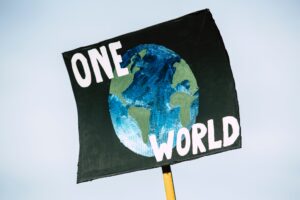
This year, what is commonly known as COP 28, or the 28th United Nations Climate Change Conference, will be held in Dubai, United Arab Emirates, from Nov. 30 to Dec. 12 to round out the calendar year. Preoccupied with the status of global conflicts, many players, such as the United Arab Emirates (UAE) and the European Union (EU), are looking forward to this year’s climate conference in hopes of progress on long-awaited climate finance deals and a possible agreement for phasing out fossil fuel emissions. Though optimism always runs high for this high-level meeting to address climate change, the world should temper its expectations while not lowering its ambitions for progress.
As a product of the landmark Paris Climate Agreement in 2015, the first global stocktake on the world’s progress toward staying under a 1.5 degrees Celsius rise in temperature will end at COP 28. The global stocktake refers to an accountability mechanism meant to present the world’s progress in achieving the framework’s goals to its signatory parties. In referring to this most recent stocktake, the overall consensus is unsurprising: “We are not on track to limit global warming to 1.5 [degrees Celsius]” and “the window for meaningful change is closing,” according to the U.N. Framework Convention on Climate Change’s website.
At last year’s conference, COP 27 in Sharm el-Sheikh, Egypt, countries were able to agree on the creation of a global loss and damage fund, which had been the culmination of years of planning and negotiation. This fund recognizes the need of poorer countries most affected by current climate emergencies and climate disasters to be relieved of the worst financial burdens caused by major climate disasters. Yet, while recognizing such a need in countries is “an important step towards climate justice,” there are no clearly outlined steps for countries to follow. This gap in multilateral agreement is one of the main priorities for the UAE hosted conference.
Reasons certainly exist for the nations in attendance at COP 28 to be optimistic, yet as incremental as some of these planned agreements are, they continue to lack the scope and breadth needed to deliver on the climate crisis. The loss and damage fund signaled a step in the right direction to addressing climate injustice for underdeveloped nations, but the agreement did not lay out substantive details in terms of administration, implementation, funding and access. As Director of the World Resources Institute’s International Climate Initiative, David Waskow puts it, “We need to think in pace and speed, of course, but we also need depth,” noting that surface-level agreements with the sole intention of agreement is a false hope for progress.
While many nations anticipate the first global stocktake at the COP 28 conference to be a grim reminder of the progress towards conforming to 1.5 degrees Celsius, they only have themselves to blame. Since the last climate conference, 7.1% of the globe’s GDP, or 7.1 trillion USD, was spent on fossil fuel subsidies from nations worldwide, representing a record surge. The United Arab Emirates engages as one of the leading oil producers in the world with a top-10 production mark of 4.2 million barrels a day. To add insult to injury, the UAE announced that the conference’s Presidency will be held by the top Executive of an Abu Dhabi-based oil company, Masdar, Sultan al-Jaber. While top climate officials in the UN admit that fossil fuels will still be a part of the global economy by 2050, oil executives should be part of the conversation but not leading it.
Last year’s COP 27 hosted a record number of delegates from oil companies from the private sector — a trend that will continue in Dubai. To set the stakes for the summit, the UAE and Al-Jaber have announced four pillars to guide the summit’s deliberations, including fast-tracking the energy transition, climate finance, climate resilience and inclusivity in their letter to the parties. Most notably, the two largest global polluters, the U.S. and China, will seemingly still be at odds over many topics, such as contributions to climate damage and transnational labor. This might upend global momentum that the EU and UAE are heading to reach a climate finance agreement, especially laying the groundwork for the previously agreed COP 27 loss and damage fund.
Every year, the Conference of Parties or COP puts climate change back on the world agenda, giving it much-needed political and public focus. However, it seems as though an apathetic attitude always follows once leaders sit down and talk. Even though diplomacy is progress, it’s not nearly enough. The world should expect little from COP 28 until the world’s major powers can agree to measures of action rather than empty promises. Global prestige beckons for the nations of the world to lead on innovation, investment and ingenuity in order to reach the goals of the 2015 Paris agreement. Yet the state of geopolitics would suggest that the agreements in need are not the ones the world will receive.







